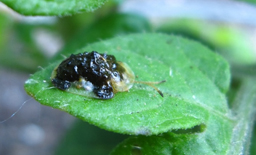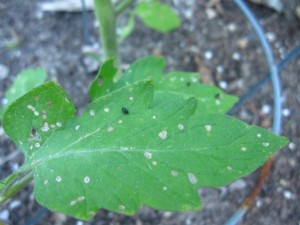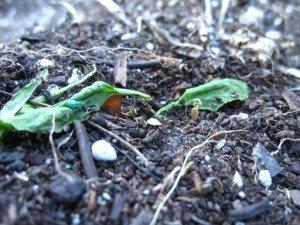Garden Nemeses
The vegetable garden is under way and that brings along with it its own set of difficulties. Bugs. As much as I love bugs in the garden, some are the kind I would rather not have munching on my bean sprouts.
So let’s learn about a few and methods you can use to prevent, deter, or remove them from the garden.
The Clavate Tortoise Beetle
This is a new one for me. Over the last few years I’ve noticed this seemingly harmless bird poop like bug resting on my tomato leaves. Not every year and not very often, but they do come around.

Damage: This beetle will chew large holes through the leaves. More precisely, it enjoys the fleshy parts of many host plants: Solanum family, particularly nightshades (tomatoes, peppers, potatoes, eggplant, and a variety of others), but morning glory also seems to be a popular meal. Turns out, these little beetles can do a fair bit of damage if your garden becomes overrun.
Control: I pick off the beetles when I see them. They don’t bite, sting, or have any poisonous secretions. Their only real method of defense is their camouflage (looking like a bit of bird poop). If there are only a few and you’re not inclined to be squishing bugs, enlist the neighbourhood kids or let them be.
Should you have too many of these little guys, a more proactive approach may be needed:
1 cup rubbing alcohol
1 tsp vegetable oil
1 litre water
Mix together and spray onto the tops and bottoms of leaves. Always do a test-run first, spraying a few leaves and observing them after 24 hours.
In the fall and spring, make sure to pick up leaf litter (it’s better in the composter anyway) and really cultivate your soil. This will disturb larvae and keep the adults from returning next year since these beetles, although they have the ability to fly, are not ones to move far.
Flea Beetles
Damage: These beetles leave very recognizable damage: tiny circular holes that may or may not go all the way through the leaf. Flea beetles are pretty skittish but if you sneak up, you will see them on the leaves.

Control: A tough one to control; easier to prevent. Diatomaceous earth sprinkled over the leaves can help but needs reapplication after rain. Your best bet is to clean up leaf litter in the fall, removing overwintering potential. In the early spring, give the soil a light turn to expose eggs to the cool night temperatures. Floating row covers will keep the beetles off the leaves as well but are easier to install with smaller plants.
Fortunately, they tend to subside mid way through June and most plants can sustain a fair bit of damage from them.
Cutworms
You will rarely see a cutworm in action. At least, that has been my experience. And it is frustrating, let me tell you.
Damage: Your plant will have sprouted, a few leaves and you’re really excited with how your garden is progressing. Then one day you get home from work and the new plants are chopped off, right through the stem at ground level. WHAT?!

Control: The soft bodies of the cutworm can’t handle diatomaceous earth and that is one of the best organic control methods. Sprinkle it not on the plant this time but around it so they have to crawl through to get to the plant.
Because some species of cutworm will actually cut down your plant from below the soil’s surface, another good way to keep your plants alive is to start them indoors or in containers away from the garden. Give them a good head start. In my experience, the cutworms (larvae of several moth species) are finished in a few weeks. By that time your plants will be a decent size and can be put into the garden.
As for prevention, keep areas around the veggie garden neat and tidy: cut down long grass in the fall and turn the soil late in the fall and early in the spring to expose eggs to the cold.



